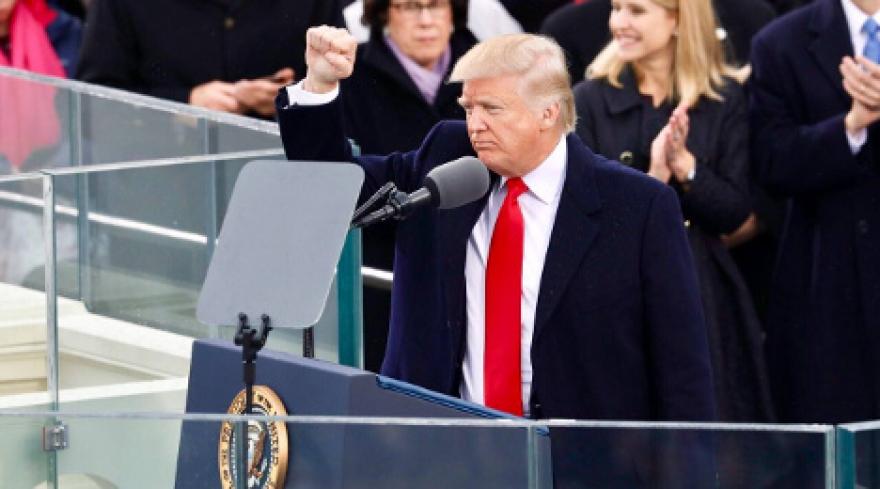Trump’s signature nullifies CFPB arbitration rule

President Trump, seen here during his inauguration, signed an order this week that nullifies the Consumer Financial Protection Bureau's rule prohibiting the use of a pre-dispute arbitration agreement. (Photo courtesy of the White House)
By subscribing, you agree to receive communications from Auto Remarketing and our partners in accordance with our Privacy Policy. We may share your information with select partners and sponsors who may contact you about their products and services. You may unsubscribe at any time.
WASHINGTON, D.C. –
President Trump followed through this week by signing H.J. Res. 111, which nullifies the Consumer Financial Protection Bureau's rule prohibiting the use of a pre-dispute arbitration agreement to prevent a consumer from filing or participating in certain class action suits.
The final step in the process of canceling the rule that received sizable support in the House but needed Vice President Pence’s action to break a tie in the Senate drew one more round of cheers of industry organizations and supporters.
“The CFPB’s rule was never about protecting consumers; rather, it was about protecting trial lawyers and their wallets,” Consumer Bankers Association president and chief executive officer Richard Hunt said.
“The bureau’s own study backs that up and proves trial lawyers would have been the real winners had this rule gone into effect,” Hunt continued.
“I would like to thank the administration and those in Congress who worked to ensure consumers have the necessary tools to receive relief without going through costly, drawn-out class action proceedings,” Hunt went on to say.
Also applauding the development was Jason Oxman, CEO of Electronic Transactions Association (ETA), which represents more than 500 companies worldwide involved in electronic transaction processing products and services.
Subscribe to Auto Remarketing to stay informed and stay ahead.
By subscribing, you agree to receive communications from Auto Remarketing and our partners in accordance with our Privacy Policy. We may share your information with select partners and sponsors who may contact you about their products and services. You may unsubscribe at any time.
“Arbitration is a simpler, flexible, faster and a more confidential process than turning to the courts to settle issues between consumers and financial companies,” Oxman said.
“As the CFPB noted in their own study, and as Treasury confirmed it its report, the majority of consumers who filed arbitration disputes did far better financially than those filed in class-action,” he continued.
Despite a last-ditch plea from CFPB director Richard Cordray, Trump used his power of the pen to nullify the rule the bureau finalized back in July.
“In signing this resolution, the president signed away consumers’ right to their day in court,” Cordray said in a message sent to SubPrime Auto Finance News. “This action tips the scales of justice in favor of Wall Street banks less than ten years after they caused the financial crisis.
“By blocking our arbitration rule, this action makes it nearly impossible for ordinary people to stand up for themselves against corporate giants like Wells Fargo and Equifax,” he continued.
“Now more than ever, it is critical that the Consumer Bureau remains a strong check on financial companies. Consumers who believe they have been wronged should contact us with their complaints,” Cordray went on to say.
One of the architects of the CFPB — Sen. Elizabeth Warren of Massachusetts — vehemently defended the rule and the bureau’s efforts when the Senate debated the Congressional Review Act resolution that eventually halted this regulation.
“Make no mistake: Anyone who votes to reverse this rule is saying loud and clear that they side with banks over their constituents — because bank lobbyists are the only people asking Congress to reverse the rule. Every other organization — all the ones that represent actual human beings, not banks — want the rule to be saved,” Warren said during a speech on the chamber floor.
“And even if there are instances in which arbitration is a better option for consumers than a class action lawsuit, the CFPB rule doesn't prevent consumers from choosing arbitration. The rule simply says that consumers should also have the freedom to go to court if they prefer it,” Warren added later.
“I’ll tell you one thing: when it comes to what’s right for consumers, I listen to servicemembers, veterans, seniors, consumers, and small businesses — not bank lobbyists. When a bunch of bank lobbyists tell you they know what's best for consumers, hang onto your wallets,” she went on to say.


